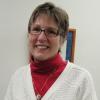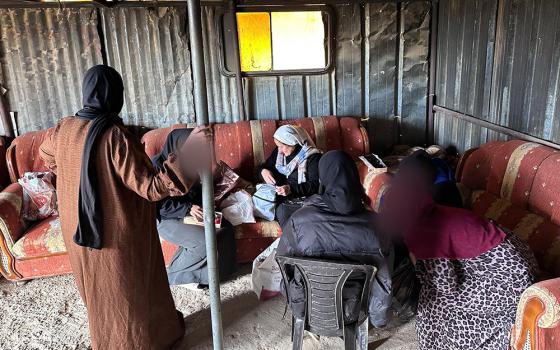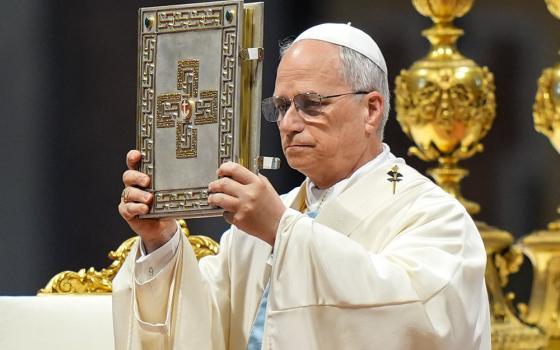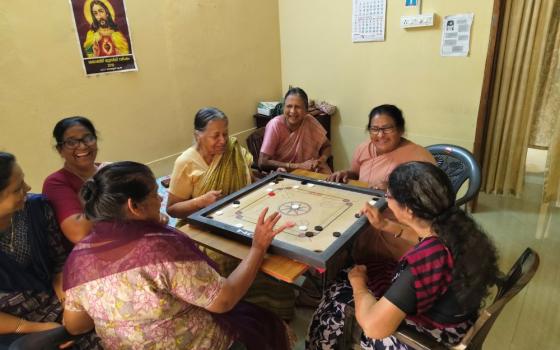
(Pixabay/RAMillu)
Doing lectio divina can be dangerous when it flirts with challenging my status quo. I had that problem when I read a reflection in Give Us This Day, that said we have to be careful about what we teach our hearts to love, because that will inform our choices.
We learn to love by being loved by our parents, family and friends. Maybe especially from those who love us even when we are at our childish worst.
But teaching our hearts to love, that's an adult task. It means I am responsible for what I pay attention to, what I teach my heart so that my choices are informed and loving.
I recently spent a week on the Texas/Mexico border where my heart had a chance to test what it loves. That we stayed at the mission Caridad de Corazón (Charity of the Heart) wasn't lost on me. I was neck-deep in choices informed by love.
The desire to "do something" about the treatment of immigrants on our southern border fueled our trip. My seven years living in Colombia during the 1980s drug wars — when I had friends assassinated for speaking truth, when entire villages were decimated by frequent massacres, when fear reigned — makes real for me what today's immigrants have faced.
When two of my sisters in community and I decided to volunteer at the border, we checked with our Benedictine Sisters in Boerne, Texas. We ended up in Eagle Pass, across the Rio Grande from Piedras Negras, Mexico, where Benedictine Sr. Ursula Herrera runs Caridad de Corazón, a Boerne Benedictine ministry
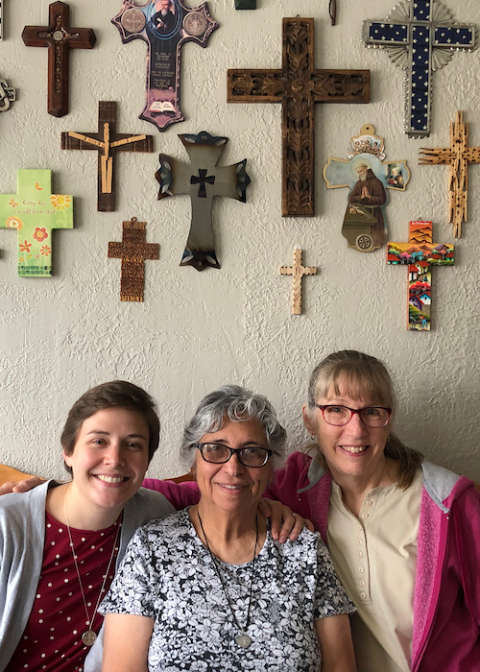
Benedictine Srs. Valerie Luckey (also from Erie), Ursula Herrera (of Boerne, Texas) and Linda Romey at Caridad de Corazón. (Provided photo)
It was a perfect heart-training ground for love in action. Not that I don't see love in action in Erie — of course I do. But I can also become inured to suffering — and to love — around me when it's a part of my daily reality. A change of circumstance can help any of us see with new eyes and teach our hearts new ways to love.
Caridad de Corazón is a spacious home in an ordinary neighborhood, with a warm kitchen, cozy breakfast nook, and plenty of comfy chairs and sofas. There's a trunkful of toys and a back yard with balls and bikes. And beds. Lots of beds. And several large dining room tables. Between April and December 2019, 2,500 refugees passed through that home, receiving overnight accommodations after their release from Immigration and Customs Enforcement detention centers. They were welcomed and fed and given clothing, hygiene products and food for the journey before they were sent to their final destinations throughout the U.S. where sponsoring relatives awaited them. They went anticipating court hearings that would pass judgement on their requests for asylum. But no matter how their stories may unfold, for at least one night, they felt the love and welcome and hospitality of Caridad de Corazón.
By the time we arrived in January 2020, their numbers had dropped drastically because of government policy changes. So we spent our days attending to the needs of our brothers and sisters on the Mexican side of the Rio Grande where Ursula, in her 23 years on the border, has helped support an extensive network of service to those most disenfranchised.
We spent a fair amount of time sorting, stacking and transporting donated food, diapers (adult and children), toys, coats and clothing, toothpaste, hairbrushes and other personal care products, blankets, and medical supplies to people living in poverty in Piedras Negras, Mexico.
Advertisement
In the course of a week, we were in two orphanages, one for boys and one for girls, both run by Mexican women religious. We delivered goods to a home for mentally and physically challenged youth and adults. We disbursed donated scholarship funds to school children. We visited soup kitchens, some that exclusively serve children. There was a migrant shelter where refugees can spend three days and two nights. If they aren't allowed to cross the border at that point, they are turned out on the street. Many end up in a more violent section of the city where they often fall victim to gangs and to poverty. People from Central America, Haiti, Cuba, South America and Africa have all passed through that center.
One of the most difficult things for me during the week were the memories of my years in Colombia that surfaced when I began speaking Spanish, entering again into the pace and warmth of Latin culture, and I fought back tears as I sang familiar hymns at liturgy. I often say I left half my heart in Colombia, and this experience touched that half.
Leaving Colombia to return to the U.S. and enter a monastic community was a very difficult decision. But there's a difference between the Colombian experience and this one: I have lived 25 years in my Benedictine community — the real training ground for my heart. And my sister Ursula has more than twice that much training — she entered her community 20 years younger than I entered mine!
My previous posts in Global Sisters Report usually related to how living religious life — creating that teaching ground for our hearts — might expand and grow as our lives continue to change. Let me offer you my newest analogy for what religious life could become: the sandbox.
New iterations of this lifestyle are necessary for the same reasons a child needs a sandbox. We need a safe place where we can play, dig, imagine, build, shape and reshape the context of our lives. A place that can be both simple and complex, rewarding and challenging — as any child who has ever tried to build a sandcastle knows.
Sandboxes offer the equivalent of a safety net for experimentation. So do religious communities. Perhaps Ursula, or anyone in religious life, could do what we do without the loving support of sisters, but knowing we are part of something bigger than ourselves, having the safety net community provides, gives us a freedom to become, give and risk.
My focus 25 years ago was on what I was giving up — my friends in Colombia, a lifestyle, a certain freedom — to come to the monastery. Now I know that what I was coming to was a "becoming" beyond anything I imagined. Sometimes when opportunity knocks, we can miss it by focusing on what we might lose, rather than on the doors and heart-learnings opening to us.
Saying yes to this one life has meant saying no to others. It's an ongoing process of learning when to say yes and when to say no in a world that often tempts me to say "yes" thoughtlessly, cutting off the vistas of where a well-placed "no" could take me.
The question now is: how do we provide space for others to grow in our wisdom traditions in ways that are life-time vowed, yes, but that might also include non-canonical lifetime commitments or any number of shorter-term commitments? The glue that binds us is what we are moving toward, not what we are leaving behind. It's time to be both decisive and assertive in sharing our sandboxes, and in what we have taught our hearts to love as we invite others to work, pray and create community with us.
[Linda Romey is a Benedictine Sister of Erie, Pennsylvania, and is the community's web developer/designer. She does marketing for them, Monasteries of the Heart and Benetvision. Prior to entering the Erie Benedictines, she worked seven years in Colombia. She is a former marketing and advertising manager for the National Catholic Reporter Publishing Company.]
